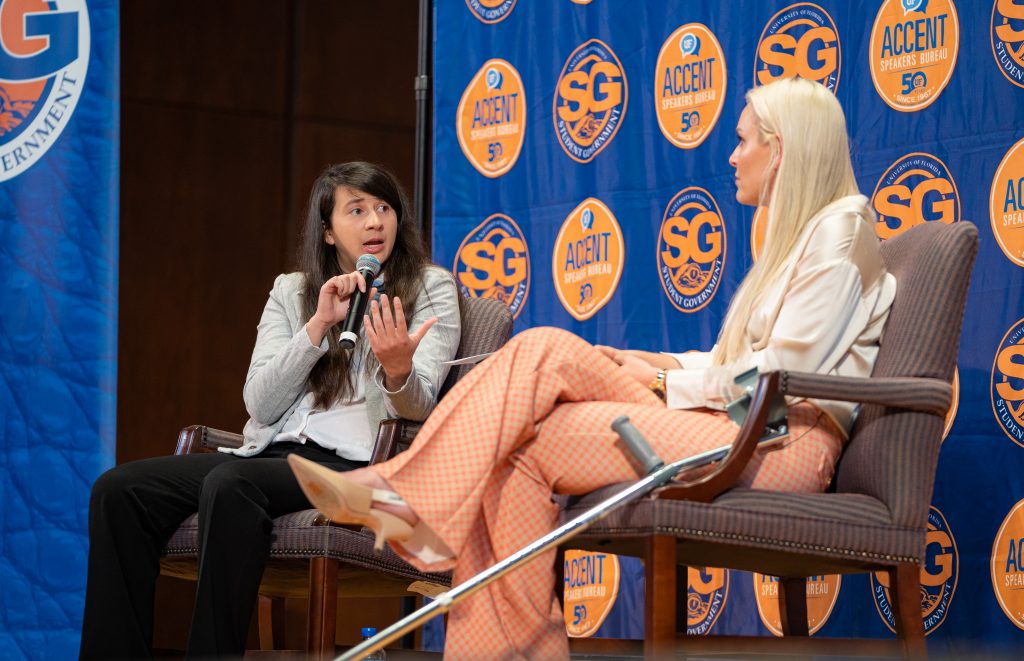Roxane Coche Driven by Issues of Women’s Equality in Sports
By Lenore Devore, B.S. Journalism 1984

At age 12, Roxane Coche knew she wanted to be involved in sports as a career. As the middle child between two brothers, and the daughter of a black-belt marathoner, she spent her youth ice skating, playing hockey and tennis. Then, she found her passion: soccer.
Her father pushed her to become a sports doctor; her mother suggested sports journalism. Not liking biology, she followed her mother’s suggestion, and now she spends her time teaching it as well as doing research – mostly on women in sports and coverage of women’s sports – at the University of Florida College of Journalism and Communications, where she is an assistant professor and the associate chair for the Department of Media Production, Management, and Technology.
A native of France, Coche admitted she could have considered going pro, but when she graduated high school a year early in 2004, the Women’s United Soccer Association – the first women’s professional league – had just disbanded. She headed to college in Paris, earning bachelor’s degrees in English and journalism, and master’s degrees in bilingual journalism and English and American civilization. Meanwhile, she was also starting her career as a freelance broadcast journalist at Europort, the largest sports broadcaster in Europe. When she got her first U.S. visa, she interned at Forbes.com, where she assisted in developing its online video presence. “That was me trying to gauge American culture a little more.”
She knew she wanted to attend college in the U.S., but funding for a master’s level was non-existent during the recession. So she set her sights on a doctorate at the University of North Carolina. “That’s what drove me; I wanted an American experience on a traditional American campus.”
After earning that doctorate, she taught, did research and was a visiting professor in Guadalajara, Mexico, where she went to further immerse herself in Spanish. Then came her dream job: covering the World Cup in Brazil in 2014. “I quit a job for it – a two-year contract for a one-month gig to cover the French national team. The life and professional experience was incredible.”
She applied to three jobs in the U.S., landing one as a lecturer at the University of North Georgia. From there, she moved to Tennessee to become an assistant professor at the University of Memphis. Three years later, Coche moved to UF as an assistant professor.

Coche immerses herself in research. One study that she’s working on is about how politicians talk about sports on social media. “Mass media is said to have agenda-setting power. They don’t tell people what to think, but they tell people what to think about – that’s what we tend to say to explain that theory. Social media has moved some of that agenda-setting power from mass media to the people, and especially politicians who have some of that legitimacy power with their citizens and in the world in general.”
Her research scrutinized politicians’ and governments’ social media posts from countries involved in both the men’s World Cup in 2018 in Russia and the women’s World Cup in 2019 in France. “Preliminary analysis shows that the politicians are talking a lot more about the men’s World Cup than they are about the women’s, giving it that sense of importance.”
For the French teams, politicians and government tweeted 34 times for the men’s team and only four for the women’s, even though France hosted the women’s World Cup. “Even if the men’s team won, that’s still quite a big difference. Both tournaments last the same amount of time, one month. So there’s not even that excuse.” She’s still working on the research.
Coche has also started a project identifying inequalities in the size of the venue where major men’s and women’s team sports tournaments have been held. She found that women’s events tend to be held in smaller stadiums and in smaller cities. The disparity is most prominent in the Americas and Europe, where men’s events are held in stadiums that can hold 200% more than women’s events. She hopes raising awareness of the issue could lead to fixing it.
“To put it in context, it’s kind of like any other type of minority status you may have compared to a dominant population,” Coche said. “Women’s sports weren’t given the opportunity to grow throughout the 20th century as much as men’s sports were. Take soccer, for instance. Women were straight-out banned from playing it in many countries around the world … and what happened during that time? Men developed leagues that became professional.”
In February 2022, U.S. women soccer players reached a $24 million settlement with the U.S. Soccer Federation in their fight for equal pay.
She also researched how Eurosport covered soccer on their various websites in the summer of 2019, finding that most countries covered off-season men’s club soccer more than the women’s World Cup. “That was the perfect summer to ramp up women’s soccer, and it’s not mass media’s primary function, but at the same time, mass media has been ramping up men’s sports for decades.”
Her biggest research project – surveying female journalists about their experiences as women in the sports media industry globally – was to occur at the Tokyo Olympics but was delayed because of COVID-19. She’s hoping to resume it in the Paris 2024 Olympics.
Coche said she loves the infrastructure available in Weimer Hall, whether it’s in the Innovation News Center or the equipment room. “It’s not just that we can dream big, it’s that we can do big. It’s an incredible privilege to be in that environment.”
One of her favorite classes to teach is Multimedia Sports Reporting. “There is a lab attached to it where students work for ESPN Gainesville once a week. Students learn hands-on and usually have very insightful questions that come from their shifts at ESPN.”
She also enjoys a new sports television course open to undergraduate and graduate students she created in Spring 2022. “We’re producing a sports show – it’s what I did in my professional life.”
Her advice to students is simple: “Be adaptable and flexible. Find ways to troubleshoot and find solutions when you hit some kind of issue.”
In her spare time, Coche likes to watch TV. Her favorite show remains “Friends.” She recalls when her dad died, the show made her laugh. And, her mother forced her to watch it in English. “That’s how I learned English. I took English classes in school but had little interest in them. ‘Friends’ kind of changed my life in a way. It had a huge impact on my life.”
Category: College News, Faculty Profiles, Profiles
Tagged: Roxane Coche Sports Media Womens' Sports
Subscribe to our News Digest


